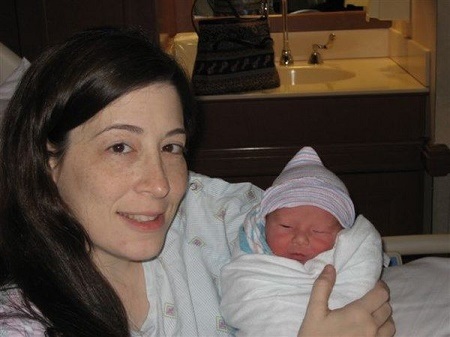A woman has shared a life-changing and touching story how she battled with herself after she tested HIV positive nine times - but there is a shocking twist.
Jenn Morson is a freelance writer from the suburbs of Annapolis, Maryland.
“It must be a mistake,” I told the doctor, confident there had been a mix-up at the lab.
“The test was run nine times,” she declared.
The lab had repeated my HIV test nine times, and my new obstetrician was lecturing me for endangering her by not disclosing my HIV status.
My husband found me crumpled on the bed. He took the phone from me and listened to what the doctor had to say. Then he wrapped his arms around me, repeating over and over, “Baby, this is impossible.”
I’d only been with my husband and we’d both tested HIV-negative the prior year as part of a life-insurance exam. So I turned to the man whose child I was carrying, whose daughter was sleeping soundly in her crib, and said, “If you cheated on me, you need to tell me now.” I believed him when he told me no, there hadn’t been anyone else.
Was I the first person to catch HIV from a public restroom? Had I contracted it from a mosquito? Worse still, had I given it to my husband? To my daughter? To our unborn child?
As soon as my daughter woke up, we took her to my parents and went straight to a lab for another blood draw. As we took turns in the stiff-backed chairs, arms tied off with rubber bands, I fell apart. The phlebotomist awkwardly patted my back, trying to assure me that even though it seemed bleak, I was going to be OK.
Could I handle a lifetime of precautions and pills? It scared me to admit that I did not know.
A follow-up visit with my OB only ratcheted up my anxiety. I told her my research had turned up cases of false-positives in pregnant women, but she was fixated on my failure to disclose my status. When I asked about HIV-2 — the type I supposedly had — she didn’t even know what it was. Instead she handed me a prescription for antianxiety pills and sent me away.
When I got home I called the Centers for Disease Control and learned that HIV-2 is a rare form of the virus. The CDC employee was extremely skeptical that I could have contracted HIV-2, but it was hard to feel reassured in the face of a positive test result. Nine times.
Next I contacted my former nurse midwife in Virginia, who offered to put me in touch with an immunologist at her hospital. He arranged for another blood draw, which would be sent to a lab in California, the only one at the time that could accurately run the PCR test for HIV-2. Results would take at least a week. In the meantime, I was told to carry on as if I had a positive diagnosis. If my baby girl were to get cut, I couldn’t kiss it to make her feel better. I couldn’t let her kiss me on the mouth, in case either of us had an open sore. I fixated on every patch of chapped skin — would it open and get blood on her?
Then there was my pregnancy. I had just made it through a hideous first trimester, including being hospitalized for morning sickness. Would I need antiretroviral medication? Would I get sick all over again? I couldn’t sleep, couldn’t eat, couldn’t slow my heart rate. I knew the stress wasn’t good for my unborn baby, but I was consumed by thoughts of not being allowed to breastfeed him, not feeling safe to clip his fingernails, not being able to smother him with kisses.
Ten days dragged past before the immunologist called. No, I was not HIV-positive. The test results showed my pregnancy had caused an elevated antibody count, not HIV. I was free to resume my normal routine.
My next call was to my OB, requesting that my records be sent to a new doctor. Her office was surprised I wanted to switch providers and made no effort to learn why I had received a false diagnosis. (Following a request for comment, the office said the OB in question retired five years ago.)
I had spent two weeks believing I was HIV-positive, an agonizing diagnosis more than a million people in the United States deal with every day. If the immunologist’s report had confirmed the positive results, would I have been strong enough to follow the drug regimen? Could I handle a lifetime of precautions and pills? It scared me to admit that I did not know.
I prided myself on a willingness to sacrifice for my children, but I was suddenly humbled to consider what that might have meant had I been HIV-positive. And while I was able to change obstetricians, how many HIV-positive women were being stigmatized and enduring judgment from her and doctors like her? I wanted to find these women and apologize for all the wrongheaded people who made them feel anything but strong.
And when my sweet baby boy was born, I covered him in kisses, no longer afraid that I was a danger to my children, but also keenly aware of how lucky I am.














No comments :
Post a Comment